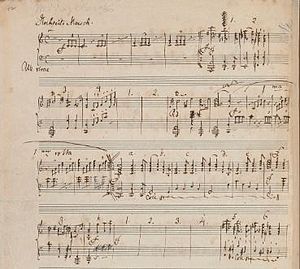Wedding March (Mendelssohn) facts for kids

The "Wedding March" is a very famous piece of music written by Felix Mendelssohn in 1842. It's part of a larger collection of music he wrote for William Shakespeare's play, A Midsummer Night's Dream. This song is one of the most popular choices for weddings. You will often hear it played on a church pipe organ during the ceremony.
Contents
What is the Wedding March?
The "Wedding March" is a special song often played at weddings. It is usually heard at the end of the ceremony. This is when the newly married couple walks out of the church or venue. This part of the wedding is called the "recessional."
Other Wedding Songs
Sometimes, the "Wedding March" is played along with other famous wedding songs. One popular song is the "Bridal Chorus" from Richard Wagner's opera Lohengrin. Another is "Prince of Denmark's March" by Jeremiah Clarke. These other songs are often played when the bride walks into the ceremony.
History of the Wedding March
The "Wedding March" was first used at a real wedding in England. This happened on June 2, 1847. Dorothy Carew married Tom Daniel at St Peter's Church in Tiverton. The organist, Samuel Reay, played the song for them.
How it Became Popular
The song became much more popular after a special royal wedding. On January 25, 1858, Victoria, Princess Royal, got married. She was the daughter of Queen Victoria. Princess Victoria chose Mendelssohn's "Wedding March" for her own wedding. Queen Victoria loved Mendelssohn's music very much. Mendelssohn often played for the Queen when he visited Britain.
Mendelssohn's Organ
There is an organ in St Ann's Church in Tottenham, England. Mendelssohn himself played this organ. He performed the "Wedding March" and other pieces there.
Famous Versions of the Song
Many musicians have loved and played the "Wedding March." Franz Liszt, a famous composer, made his own version of the song. He called it "Wedding March and Dance of the Elves." He wrote this version between 1849 and 1850.
Horowitz's Piano Version
Later, a famous pianist named Vladimir Horowitz created his own version. He based it on Liszt's work. Horowitz's version was a very difficult and exciting piece for the piano. He often played it as an extra song at the end of his concerts.
See also
 In Spanish: Marcha nupcial (Mendelssohn) para niños
In Spanish: Marcha nupcial (Mendelssohn) para niños

